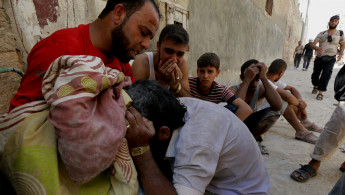Use of barrel bombs by Syrian regime 'increasing'
But a report published on Tuesday evening by Human Rights Watch (HRW) says that over the last year, the Syrian government has conducted hundreds of "new indiscriminate attacks" from the air with munitions that include "improvised weapons such as barrel bombs", and that barrel bombs have killed or injured thousands of civilians in rebel-held areas.
Barrel bombs
The watchdog came to its conclusions after monitoring attacks in the Aleppo and Deraa regions, where barrel bombs have hit schools, hospitals and markets. It also heard witness testimonies, and examined video and photographic evidence as well as satellite images.
| Barrel bombs are crude but deadly weapons. |
Barrel bombs are crude but deadly weapons. They consist of oil drums, gas cylinders or water tanks filled with explosives and scrap metal to increase fragmentation. They are devastating when dropped on civilian areas from helicopters.
Women and children made up two-third of the victims, a doctor from Deraa told HRW in late 2014. Another doctor in a hospital in Amman treating Syrians said that 50 to 60 percent of the injured were women and children, and that their injuries were fragmentation wounds from explosives such as barrel bombs.
Deaths from air strikes have not only been due to barrel bombs, but residents in rebel-held areas of Aleppo and Deraa told HRW that they accounted for the majority of aerial attacks.
HRW reported that armed rebel groups have also carried out indiscriminate attacks, through car bombs and other explosives, in government-controlled areas. It has called for an arms embargo on the Syrian government and any other groups "implicated in widespread or systematic human rights abuses".
An embargo on providing or servicing helicopters would limit the Syrian government's ability to conduct such aerial attacks.
As for Assad, "we know he is simply lying", said Philippe Bolopion, UN director at HRW. "We know it's the Syrian government using these deadly weapons because the rebels don't have helicopters, only the government does."
Security Council: condemnation but no action
The UN Security council condemned the Syrian government's attacks a year ago but has not yet responded to the more recent ones. It is due to meet on Thursday to report on Resolution 2139, passed on 22 February 2014, which demanded an end to the use of barrel bombs in populated areas.
"Despite this flagrant disregard for the Security Council resolution, the Syrian government has paid no price for this," said Bolopion.
Since Resolution 2139 was passed, there have been 6,163 civilian deaths due to barrel bombs in aerial attacks, including 1,892 children and 1,720 women, according to the Syrian Network for Human Rights in its report of 22 February.
"For a year, the Security Council has done nothing to stop Bashar al-Assad's murderous air bombing campaign on rebel-held areas, which has terrorized, killed and displaced civilians," said Nadim Houry, Middle East director HRW.
"The onus is on Assad's protectors on the Security Council to stop the slaughter of Syrian civilians by their government," Houry said. "Other countries, including Western and emerging powers, should increase the pressure on Russia and China to stop blocking international action to curb the Syrian government's deadly crimes."
Under international law, the provision of weapons that are likely to be used to commit crimes against humanity may amount to assisting in those crimes. Arms suppliers could be criminal liable as an accessories to those crimes and face prosecution, HRW said.





 Follow the Middle East's top stories in English at The New Arab on Google News
Follow the Middle East's top stories in English at The New Arab on Google News
![The UAE is widely suspected of arming the RSF militia [Getty]](/sites/default/files/styles/image_330x185/public/2024-11/GettyImages-472529908.jpg?h=69f2b9d0&itok=Yauw3YTG)
![Netanyahu furiously denounced the ICC [Getty]](/sites/default/files/styles/image_330x185/public/2024-11/GettyImages-2169352575.jpg?h=199d8c1f&itok=-vRiruf5)
![Both Hamas and the Palestinian Authority welcomed the ICC arrest warrants [Getty]](/sites/default/files/styles/image_330x185/public/2024-11/GettyImages-2178351173.jpg?h=199d8c1f&itok=TV858iVg)